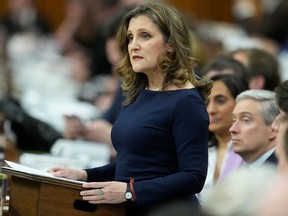Article content
Finance Minister Chrystia Freeland delivered a federal budget Tuesday that keeps the deficit capped at $40 billion, but introduces new taxes that largely offset billions in new spending. Here is what the economists say about changes to the capital gains tax.
Capital gains tax
Article content
Canada’s federal budget 2024 means high-worth individuals, corporations and trusts will pay more in capital gains taxes, which some economists say will be another blow to Canada’s already dismal productivity.
Article content
“Canada’s productivity is in crisis and the best way to get it back up is to attract new investments,” said Renaud Brossard, vice-president of communications at the Montreal Economic Institute in a statement after the budget. “And few are those who have been able to lure investments and job creators with promises of higher taxes.
“With this budget, the Trudeau government is shooting us in the foot.”
The inclusion rate increases to 66 per cent, up from 50 per cent, on capital gains above $250,000 for individuals and on all capital gains for corporations and trusts. The change is expected to yield an additional $19.4 billion over four years.
The Canadian Chamber of Commerce said not only did the tax changes add to businesses’ burden, the budget also lacked a clear plan to promote productivity and economic growth.
“We oppose any measure which will increase the costs for businesses and Canadians when both are currently experiencing challenging economic headwinds,” said Jessica Brandon-Jepp, senior director of the Chamber’s fiscal and financial services policy.
Article content
“Throttling the success of Canadian businesses with new taxes will limit opportunities and employment for Canadians, putting economic growth and productivity even further out of reach,” she said.
Canada is in the midst of a “prolonged slump” in capital spending and in that environment the capital gains tax changes are “at best unhelpful in promoting capital investment that Canada desperately needs,” said economists at Toronto Dominion Bank.
“Consider the decision of an entrepreneur deciding where to locate their start-up,” said the team led by chief economist Beata Caranci.
“Considering the entire package of possible tax treatment of both the business and the longer-term treatment of divestment, a higher tax on that divestment could very well be the straw that breaks the camel’s back and pushes that new firm elsewhere in a globally competitive environment.”
The impact of the capital gains tax hike will also not be limited to the very wealthy and corporate Canada, said BMO Capital Markets senior economist Robert Kavcic.
“While the capital gains threshold for individuals sounds high on the surface, consider that high real estate values will mean that many sellers of investment or cottage properties, with a much lower cost base, will get dinged by the higher inclusion rate,” he said in a note.
Article content
“This will similarly be a concern for Baby Boomers passing down property to younger generations. Principal residences will remain exempt.”
To balance the impact of tax hikes, the government directed some of its new spending towards measures to boost business investment, said Stephen Brown, deputy chief North America economist at Capital Economics Ltd.
Of the $12 billion in new spending this year, $3 billion is for policies “ostensibly aimed at boosting economic growth, including allowing firms to write off the full cost of various technology R&D investments,” said Brown.
Read our full coverage of the 2024 federal budget
Additional reporting by The Canadian Press
Share this article in your social network











